|
|
|
Sort Order |
|
|
|
Items / Page
|
|
|
|
|
|
|
| Srl | Item |
| 1 |
ID:
111936
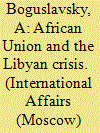

|
|
|
|
|
| Publication |
2012.
|
| Summary/Abstract |
ARLY IN SEPTEMBER 2011, the forces of the National Transitional Council (NTC) of Libya backed, on a mass scale, by NATO assumed control over the larger part of the country and captured Tripoli. The regime change became a fact yet the country will have to tread a long and arduous road of rehabilitation of its now practically non-existent infrastructure and address a more important and even more challenging task of national reconciliation and revival of national unity. It seems that external military interference (far beyond the limits outlined by UN Resolution 1973) has made this dual task even harder to achieve. It caused unnecessary loss of civilian lives, stirred up hard feelings which pushed the east and west of the country apart, destroyed civilian objects and started uncontrolled proliferation of all sorts of weaponry.
|
|
|
|
|
|
|
|
|
|
|
|
|
|
|
|
| 2 |
ID:
119641
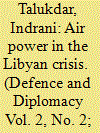

|
|
|
|
|
| Publication |
2013.
|
| Summary/Abstract |
Looking at the past century, it is possible to identify two eras of distinct international relationships between states: (1) the bipolar system (during the cold war); and (2) the unipolar or multipolar system (at present). This change of the international order has also produced a change in the way the use of force is seen in solving economic, ideological, or ethnic problems. The vacuume created with the dissolution of one of the two superpowers (USSR)-a vacuum not covered by the remaining superpower-has de facto opened the way to the proliferation of small wars. But even if small wars do not represent an immediate threat for most Western countries, prolonged small wars can jeopardise the international order. Apart from wars in the conventional and traditional way, unconventional warfare like civil war, ethnicwar, religious war, guerrilla warfare, terrorism, etc within a state also has the equal potential to endanger the international security. The Libyan crisis which saw the end of a dictatorial regime had such potential.
|
|
|
|
|
|
|
|
|
|
|
|
|
|
|
|
| 3 |
ID:
117398
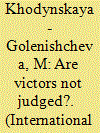

|
|
|
|
|
| Publication |
2012.
|
| Summary/Abstract |
THE ARAB SPRING which is still raging in the Middle East gives us all second thoughts about the methods of crisis settlement in any corner of the world. The Libyan crisis and the NATO operation codenamed Unified Protector suggests two questions: How far can the international community or its members go in their assistance to the state in crisis? What could and should be done to keep this aid within international law and to prevent it from developing into shameless abetting of the forces seeking regime change rather than democratic changes? In Libya, NATO demonstrated that foreign interference can become a "continuation of political intercourse." Certain states are trying to pass a "short victorious war" for a legitimate instrument the international community can employ to help peoples "fight for democracy" irrespective of the state, its role in regional stability, specifics of its political system and ethnoconfessional makeup and the people's readiness to greet changes. In fact, this tactics is employed for the sake of prompt economic and political dividends which painstaking and consistent efforts to develop political systems, economic and social spheres of these states cannot bring.
|
|
|
|
|
|
|
|
|
|
|
|
|
|
|
|
| 4 |
ID:
131627
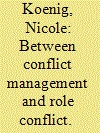

|
|
|
|
|
| Publication |
2014.
|
| Summary/Abstract |
This paper assesses the role of the European Union in the Libyan crisis (2011) and critically considers the implications for its evolution as an international security actor. Employing role theory, the paper reviews the historical development of the Union's security actorness and sheds specific light on the balance between self-conception and external expectations in the case of the Libyan crisis. Its central argument is that, despite external expectations and European narratives of a 'comprehensive power role', the Libyan crisis showed that the Union still acts in line with its traditional role as a civilian power. The inability to go beyond civilian power stemmed from internal dissonance on a potential hard power role and a corresponding lack of material capabilities. The growing gap between expectations about comprehensive actorness on the one hand and performance on the other is likely to damage the Union's future credibility as an international security actor.
|
|
|
|
|
|
|
|
|
|
|
|
|
|
|
|
| 5 |
ID:
109184
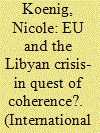

|
|
|
|
|
| Publication |
2011.
|
| Summary/Abstract |
The EU's reaction is slow; the EU is divided; the EU is unable to deliver: time and time again, newspapers depict the image of an incoherent and uncoordinated EU foreign policy. This time, the topic under discussion was the EU's response to the Libyan crisis. Many have compared the EU's internal divisions over Libya with those over the Iraq war, an often used example to illustrate the limits of the Common Foreign and Security Policy (CFSP). This article aims to assess the coherence of the EU's short- to medium-term response to the Libyan crisis. It distinguishes between the horizontal, inter-institutional, vertical and multilateral dimensions of EU coherence. The analysis shows that unilateral actions or inactions of the member states mainly account for the EU's incoherent response. The post-Lisbon institutional structure has done little to compensate for these internal divisions. While the EU cannot change the course of national foreign policies, it should increase its 'leadership for coherence', Europeanise its crisis response in the medium term and aim at preventing incoherence in the longer term.
|
|
|
|
|
|
|
|
|
|
|
|
|
|
|
|
| 6 |
ID:
120453


|
|
|
|
|
| Publication |
2013.
|
| Summary/Abstract |
This article seeks to explain the decisions by Nicolas Sarkozy's France and David Cameron's Britain to intervene in the 2011 Libyan crisis. None of the three major theories of international relations-constructivism, defensive realism and liberalism-can explain on its own such intervention decisions as the Libya case. The article's novel analytical model proposes that each theory emphasizes factors and mechanisms that explain part of the decision-making process and that these factors interact with state behaviour in complex ways. Britain and France initially began to consider intervention because they felt that the emergent norm of the 'responsibility to protect' applied to the Libyan case and because they believed the massive flows of refugees fleeing the violence were a threat to their border security. Both countries believed military intervention could be successful at relatively low cost and that if they did not intervene the problem would not be solved. At that point, the Sarkozy and Cameron governments engaged in initial action that made them more likely to intervene by jeopardizing their future economic relations with the Gaddafi regime and making him more likely to threaten them with future terrorist attacks. Taking initial action also meant that French and British prestige would ultimately have suffered had they not intervened to achieve a satisfactory solution to the crisis. Paris and London viewed international and regional support as a critical prerequisite for intervention and they sought and attained it. Finally, the Sarkozy and Cameron governments were able to minimize any domestic political risk of intervening because they had public and/or opposition party support.
|
|
|
|
|
|
|
|
|
|
|
|
|
|
|
|
| 7 |
ID:
139590
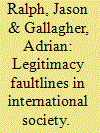

|
|
|
|
|
| Summary/Abstract |
There is a perceived legitimacy deficit in contemporary international society. A symptom of this is the political contestation surrounding the 2011 Libyan crisis and its influence on the 2011–13 Syrian crisis. This involved criticism being levelled at the coalition led by the so-called Permanent-3 for the way they implemented the protection of civilians mandate, as well as for the referral of the Libyan situation to the International Criminal Court. How the P3 respond to these developments will be driven in part by how this ‘legitimacy fault line’ is interpreted. The purpose of this article is to first give an interpretation that is informed by the work of contemporary English School scholars and the political theorists they draw on; and second to provide the context in which specific policy recommendations may guide the response of the P3 states. We argue that because the new legitimacy fault line divides on the procedural question of who decides how international society should meet its responsibilities rather than substantive disagreements about what those responsibilities are (that is, human protection and justice) the challenge to the liberal agenda of the P3 is not radical. However, we also argue that ignoring the procedural concerns of the African and BRICS states is not outcome neutral and could in fact do harm to both the ICC and the wider implementation of R2P. We consider two proposals for procedural reform and examine how the P3 response would impact on their claim to be good international citizens.
|
|
|
|
|
|
|
|
|
|
|
|
|
|
|
|
| 8 |
ID:
174658


|
|
|
|
|
| Summary/Abstract |
On April 4, 2019, General Khalifa Haftar, commander of the Libyan National Army (LNA) and the strongman of the Al Bayda government, a Libyan faction associated with the “Tobruk Parliament,” launched an assault on the capital, Tripoli, in a final bid to conquer the country. Indeed, Libya has been divided since 2014 between the government of Tripoli, called the Government of National Accord (GNA), formed under UN mediation in December 2015, and the Al Bayda government, which emanates from the Tobruk parliament. Beyond a rivalry between the two groups, this represents a conflict between regional and international powers, each backing one of the warring parties.
|
|
|
|
|
|
|
|
|
|
|
|
|
|
|
|
| 9 |
ID:
117355
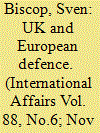

|
|
|
|
|
| Publication |
2012.
|
| Summary/Abstract |
The UK, with France, initiated the European, today Common, Security and Defence Policy (ESDP/CSDP) in 1998-9. A strong consensus on the need to address capability shortfalls, which the UK accepted to attempt under the EU flag, however masked the lack of consensus about the extent to which the EU would also make policy and launch operations (which would require permanent planning and conduct structures). This debate about the degree of EU autonomy vis-à-vis NATO and the US is one of the reasons why Europeans collectively have no strategic vision on the regions and scenarios for which they should assume responsibility, as the Libyan crisis demonstrated. But also on the capability side, the UK in the end never fully committed, withholding the necessary budget to allow the European Defence Agency to operate as intended and resisting moves towards military integration, such as Permanent Structured Cooperation, in favour of bilateral arrangements such as the 2010 agreement with France. Meanwhile, however, the US came to demand that Europe take charge, autonomously, of crisis management in its own neighbourhood. British policy now seems to have struck a dead end. London has managed to slow down the CSDP. NATO has seen even fewer results in capability development, but when it comes to operations, in the absence of US leadership NATO is equally blocked by the lack of a collective European strategic vision. London, with Paris, remains the only European actor able and willing to engage in crisis management and war, but cannot mobilize many other capitals to join in. Unlike the US, the UK does not have the means to go in alone if necessary. A fundamental revision of policy is needed if the UK wants to maintain its level of influence in security and defence.
|
|
|
|
|
|
|
|
|
|
|
|
|
|
|
|
|
|
|
|
|